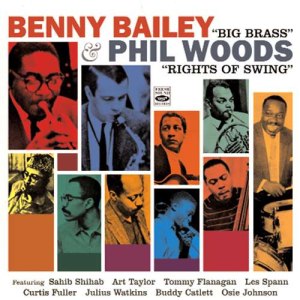Big Brass
Hard Sock Dance
Alison
Tipsy
Please Say Yes
A Kiss To Build A Dream On
Maud’s Mood
Rights of Swing
Prelude and Part 1; Part II; Part III; Part IV; Part V
Personnel:
Big Brass
Benny Bailey (trumpet): Julius Watkins (French horn): Phil Woods
(alto sax, bass clarinet): Tommy Flanagan (piano); Les Spann (flute and
guitar); Buddy Catlett (bass): Art Taylor (drums)
Rights of Swing
Phil Woods’ Ensemble; Benny Bailey (trumpet): Julius Watkins
(French horn): Phil Woods (alto sax): Curtis Fuller (trombone); Sahib Shihab
(baritone sax): Tommy Flanagan (piano): Buddy Catlett (bass): Osie Johnson
(drums) plus Willie Dennis (trombone) and Mickey Roker (drums) replace
Fuller and Johnson on Part V
Recorded 1960-61 [78:40]
Intellectual property first; it’s Benny Bailey’s Big
Brass and Phil Woods’s Rights of Swing though both men play
in the other’s band. The elite personnel ensure that solo outings and
ensembles are never without interest. Taking Bailey’s portion first we
find that this November 1960 session stands up pretty well. There’s a
striking hard bop blues feel to it which is varied through the use of the
rather pensive ballad Alison and the frolicsome Oliver Nelson tune
Tipsy where French horn player Julius Watkins makes a valuable
contribution, Woods picking up his phrases with characteristic insouciance,
his alto splendidly agile and gleaming. Tommy Flanagan is the date’s
pianist and he kicks off A Kiss To Build A Dream On with his
trademark lyricism and warmth. Les Spann stretches out here, but it’s
Benny Bailey’s sprightly trumpet that dominates through its daring and
its bristling unconventionality. Woods plays his bass clarinet on several of
these cuts, notably Maud’s Mood, a Bailey original and an
insouciant blues.
Wood’s Rights of Swing is divided into a Prelude and
five succeeding parts, thus titled. The first part is variable but
it’s not until Part II, a Ballad, that things begin to excite. Bailey
plays a richly lyrical solo, and Woods a heartfelt one, though Watkins
disappoints in his less fluent solo. Woods is ebullient in the waltz motif
of Part III, Flanagan taking a goodish but not outstanding solo. Woods is
drenched in the Blues and shows it in Part IV, a scherzo with intriguingly
voiced ensemble writing, arranged by Woods. There’s a Gospel kick here
too. The final part was recorded a fortnight later with a change of
personnel; trombonist Willie Dennis and drummer Mickey Roker replace Curtis
Fuller and Osie Johnson. There’s an uncredited flute solo and one can
plainly hear Woods coming in a fraction too soon before an ensemble passage.
These well-restored tracks come with an excellent sleeve note.
Jonathan Woolf
